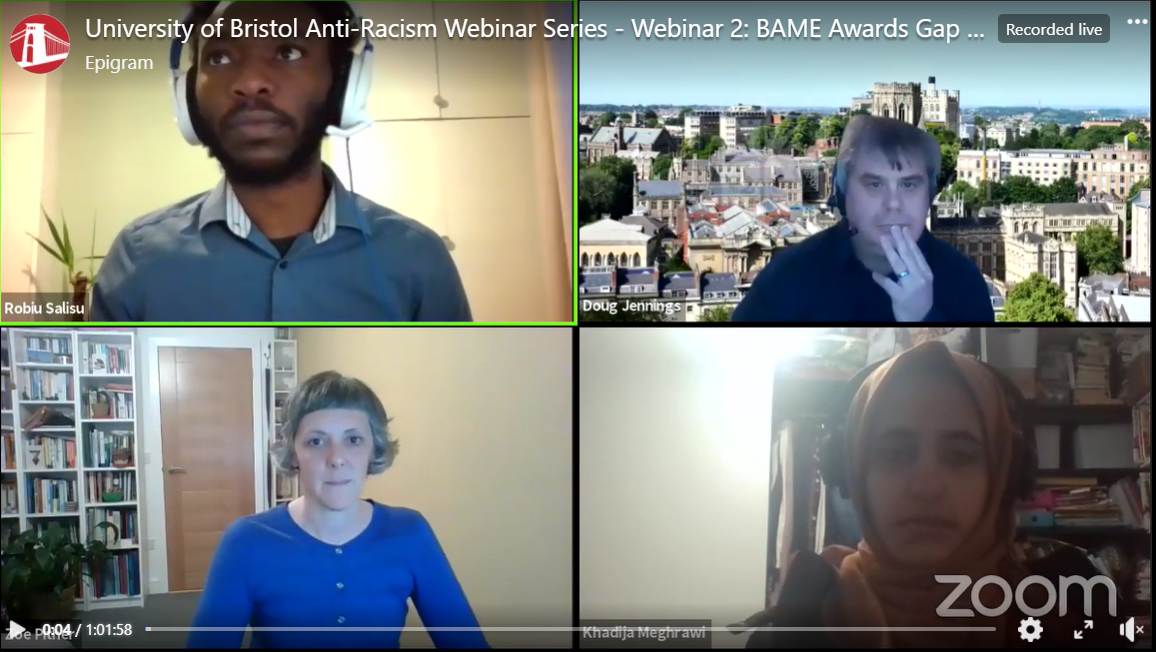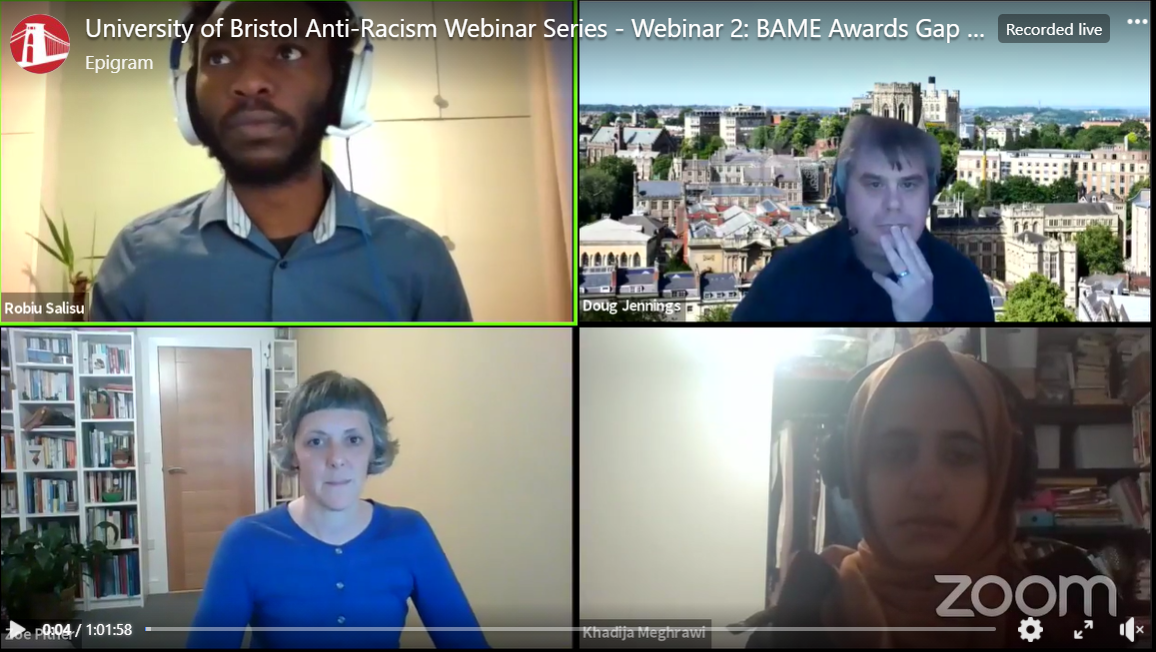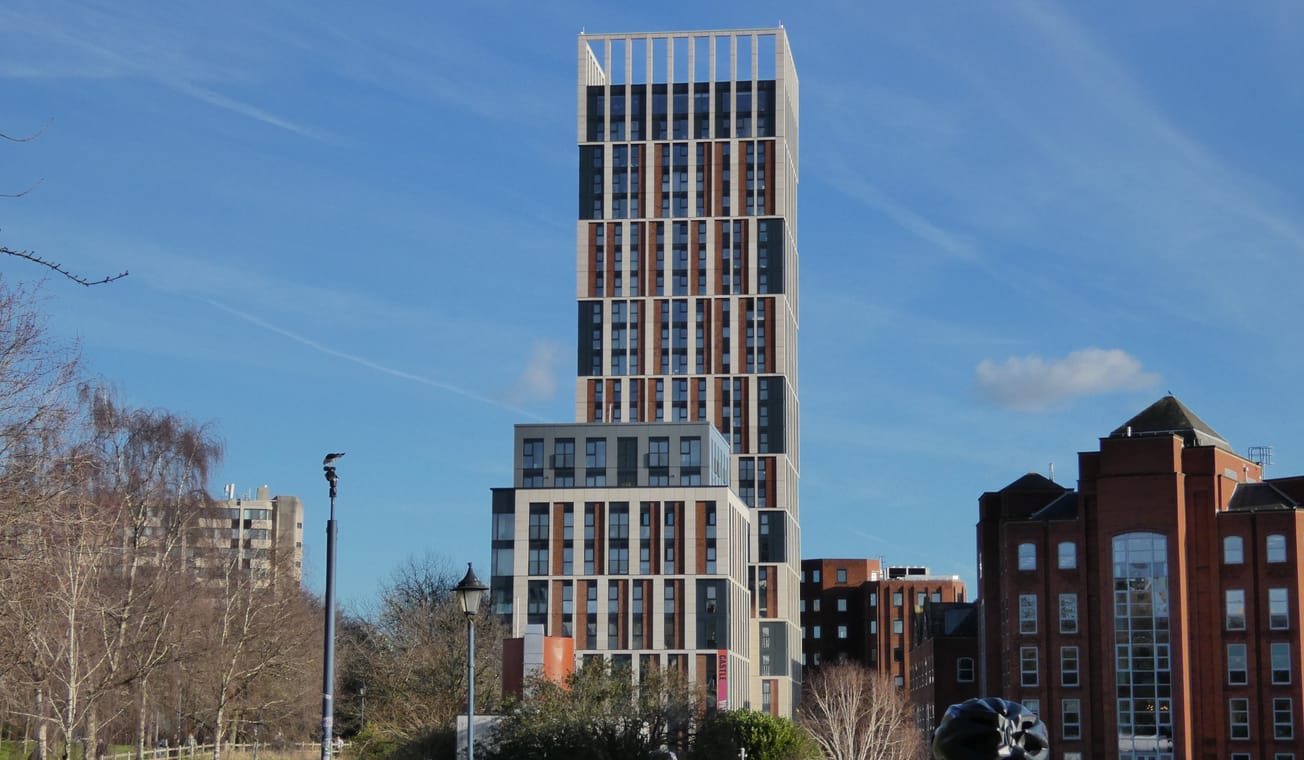By Tia Bahia, BAME Affairs Correspondent
The second anti-racism webinar organised by the University of Bristol Anti-Racism Steering Group, in collaboration with Epigram and the BAME Network, took place on 11 February.
Hosted again by Robiu Salisu, the University’s Student Inclusion Officer, and Khadija Meghrawi, Chair of the BAME Network, the hour-long event focused on the awards gap between BAME students and their white counterparts at degree level ,as well as examining racial diversity within the student body.
The BAME attainment/awards gap refers to the statistics which reflect that white students are more frequently awarded higher level awards at degree level than Black, Asian and minority ethnic students.
Guest speakers Zoe Pither, Head of Student Inclusion, and Doug Jennings, Deputy Director of Home Recruitment were in attendance, giving insight into the ongoing work they are involved in that addresses issues of diversity and inequality of attainment at the University. The format of the webinar saw them take both pre-submitted and live audience questions.
Doug Jennings started with a short presentation outlining some key statistics and plans to tackle the lack of racial diversity in the student body. He explained the progress that has been made with the intake of black home undergraduates, which rose from 1.8% in 2016/17 to 2.9% in 2020/21 - a target has been set to increase this figure to 4.8% by 2024/25.
He outlined some of the initiatives and programmes now in place. These schemes include Next Step Bristol, Insight Into Bristol, and Black Bristol Scholarships, as well as specific sessions at open days and other University recruitment events. Doug stressed the need to place existing students at the centre of the University’s efforts, saying ‘We know that the experience of our current students informs prospective students’.
Zoe Pither then took the virtual stage to explain the University’s progress towards eliminating the awards gap, armed with statistics displayed on graphs. Zoe used the first of these graphs to illustrate the developments the University is making. She highlighted that ‘[the University ] is making quicker progress than the national average’. However, it was also made clear that ‘there is still a long way to go’.
Here is a slide from Zoe showing degree classification over the last few years broken up by ethnic group pic.twitter.com/9qr5ccKerv
— Epigram (@EpigramPaper) February 11, 2021
The second of Zoe’s graphs broke down the awards gap further by showing differences between racial groups, that are often grouped under the umbrella term BAME, but tend to have differing experiences. Zoe said, ‘in reality when it comes to the attainment gap it’s not just one group of students that are disadvantaged here’ which is why she expressed the need for data to be looked at on a ‘granular level’.
Indeed, Zoe stated that ‘the [attainment] gap appears by the end of year one’ of degree courses. Consequently, the University’s ambitious goal that Zoe says ‘we are absolutely committed to making progress on’ is to eliminate the awards gap for BAME students by 2025.
The event then entered the Q&A segment, with Khadija asking the first audience question - the University has previously made commitments to action, has anything changed from 3 or 4 years ago? Zoe Pither took this question and said that changes have been made ‘but not enough yet’.
‘I do think its fair to say we have not made as much progress as we want to’
‘The black men and women talk sessions are really valuable in giving students an opportunity to come together and talk about their wellbeing’, They were also the source of positive feedback from students in the Race Equality Survey in 2019.
Zoe assured the audience that changes are being made and results are being yielded, however she acknowledged that these have fallen short of expectation, saying ‘I do think its fair to say we have not made as much progress as we want to’.
Doug Jennings was asked the next question on the topic of funding for lower income and black and minority ethnic postgraduate students. Doug concisely answered, ‘We absolutely recognise the need for financial support at postgraduate level’ but ‘we are not in a position to finalise anything yet’.
‘We all need to educate ourselves, not just once but on an ongoing basis’
When asked his opinion on underrepresentation of Asian students at the University, Doug explained that the Office For Students has identified this gap and set the University a target for the amount of Asian students in the student population at 7.5%. In 2020, the University exceeded this target with a figure of 8.3%.
An audience member asked the panel if more should be done to educate or raise awareness amongst white staff and students of the disparities that exist in their favour. In response, Zoe discussed the need to remove the burden of solving these racial issues from ethnic minorities and explained the work in conjunction with the Student’s Union around training personal tutors with clear messages about what support is needed by BAME students, she said ‘We all need to educate ourselves, not just once but on an ongoing basis.’
During the event, multiple attendees wanted to hear the panel address the strong drop in black students being awarded 2:1 or 1st at degree level in 2017. Zoe said there was ‘not a clear cause in the data’ but it was ‘statistically significant’ so it can be concluded that there was a direct relationship between race and outcome.
Responding to a question about the effect of COVID-19 on BAME student recruitment, Doug Jennings stated that in order for the University to work on issues, being aware is the first step. He said ‘The major thing at the moment is just knowing that there has been disadvantages’.
‘student societies have often, quite infamously, been a breeding ground for a lot of the issues we’ve spoken about’
Another question that picked up on the effects of COVID-19 was how the University is addressing the issue of BAME students not feeling like they belong at the University, and how this struggle will have been exacerbated with the switch to online learning. Zoe said, ‘part of our response has been to make sure that all of our services were available online really quickly and we have seen huge uptake of that’.
A further important question to many students is: how can the University ensure that societies have a diverse range of members? Zoe addressed this question, explaining ‘the University cannot do a huge amount to ensure that, but we can do some things to support it’.
The first Anti-Racism Webinar – Black Lives Matter, a catalyst for change
Anti-Racism webinar series to commence on Thursday
The SU has implemented equality officers for societies as well as trying to ‘raise awareness with students about the opportunities clubs and societies can present in terms of connecting with others.’
Khadija added to the discussion saying, ‘student societies have often, quite infamously, been a breeding ground for a lot of the issues we’ve spoken about’. Doug then made the point that ‘As a University we have to be an environment where things that are unacceptable get called out’, stressing the need for a collective effort from all members of the University of Bristol community.

Zoe was asked to give some information about training courses for staff members and whether or not they are mandatory. She mentioned that equality, diversity and inclusion training is mandatory for staff members however it is not in-depth. New initiatives such as a module titles 'Disrupting Racism' are being introduced for staff members, as well as an Upstander programme which gives bystander training. Zoe hopes these will soon be offered to students as well to ‘help equip you for how to respond in circumstances where you see or experience unacceptable behaviour’.
The final question asked, by postgraduate student Amber, was ‘what is Bristol doing to support black PHD students in their application process?’. Amber detailed her own experience of feeling like she had a lack of information and mentoring given to her in her own PHD programme. She felt that it was clear the people that got funded had support around them or knew the academics. Amber went onto ask ‘Is the university doing anything to address this disparity?’.
Zoe Pither admitted that this is an area the university is beginning to look at, and consequently the ‘work is at a very early stage’. She explained that the Bristol Doctoral College are starting to look at what can be done about this.
Epigram’s Editor-in-Chief Robin Connolly gave some final comments to bring the event to a close. She said: ‘from a student perspective, I have found that the topic of this week’s webinar is a topic that is less understood than others’ … ‘as a white student it is important to keep asking yourself what you can do and what is in your sphere of influence’.
The next Anti-Racism webinar will take place on Thursday 18 February and will discuss Decolonising the Curriculum. Guest speakers include Alvin Birdi, Associate Pro-Vice Chancellor and Professor Madhu Krishnan.
Featured Image: Courtesy of webinar organisers
To register for the next webinar and to submit your questions, please use the link, HERE.









